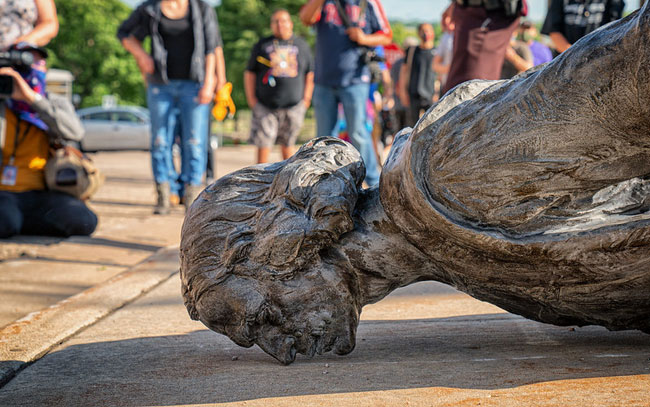Val Dunaevsky | The Unsuspected Mundane Reasons for the War on (Some) Monuments during This Year’s Hot Summer. A Satire
The masses may have trivial, or less than trivial, reasons to vent their anger. Channeling it in a proper way is a trick that our city managers can learn from the Japanese.

On taking down the Columbus monuments. Several days ago, I went to a local Italian grocery to buy, along with some delicacies, some spinach bread, or rather spinach-stuffed bread, which is one of my most favorite Italian foods. To my regret, I did not find the item in the deli section. Instead, and deceptively, several pepperoni bread loaves were laying along the counter in the same transparent plastic wrap that the spinach bread is usually displayed in. For me, and I suspect many others, pepperoni bread is very different from the delicious, nutritious, and aromatic spinach bread.
If one can use the anthropomorphic analogy for contrasting the taste qualities of pieces of bread, then the difference between them can be compared, for example, to those between Republican vice-presidential candidate Senator Dan Quayle and the 35th President of the United States, John F. Kennedy. Democratic vice-presidential candidate Senator Lloyd Bentsen lampooned the differences between the two in his famous remark to Quayle, “Senator, I knew Jack Kennedy, and you‘re no Jack Kennedy,” during the 1988 vice-presidential debates. Sure enough, spinach bread is certainly not pepperoni bread!
A young sales assistant told me that he did not know why they had no spinach bread, and he did not know when it would be available again. This news upset me and produced an emotional urge to react in some way. Enraged, I ran to the manager’s office for an explanation. The manager, who is also the grocery’s owner, told me that the cost of the spinach “went through the roof” recently, rendering spinach bread unprofitable. He admitted that many Italian groceries across the country are likely plagued by a similar situation.I began to suspect that such a turn of events does not completely exclude the masses, who will have found themselves in limbo without bread (oh, that bread!), and whose entertainment has been curtailed by the COVID-19 lockdowns. Would they go berserk, unleashing on the world the destructive urges that smolder quietly in their hearts? Understandably, the object of the masses’ envy and hatred should be the father of all the loaves of the spinach bread, the famous Italian, Christopher Columbus, who can be found materialized in the form of somber monuments in various American cities, and thus conveniently located on the receiving end of the delusional masses’ ire. Who cares that the explorer himself was brought back to Spain in chains and died in poverty?
On the toppling of the statue of Cervantes. The brainchild of 17th-century Spanish author Miguel de Cervantes, the protagonist of the immortal novel Don Quixote, became delusional by reading chivalric romances and then set out to fight windmills, mistaking them for wicked giants. In time, however, these windmills have grown to become humongous wind turbines, the good giants of our brave new world, where, apparently and unfortunately, there is no place for the windmill offender, even from the remote past.………………………………………………………………………………………
To preempt the defacing of our cities and toppling the monuments, the leaders of the American communities may take a little lesson from the smart Japanese, those people of the Land of the Rising Sun. I heard that in some big companies in Japan, management found a clever way to channel the frustration of the employees: They allow the pummeling of the rubber replicas of the bosses and managers, which are placed in the special areas.
Комментариев нет:
Отправить комментарий